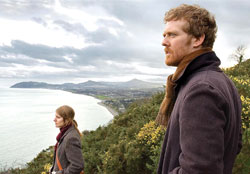|
|
John Carney's Once, aptly named, is quite a singular film. Although a musical, it is very different from both the Bollywood and the increasingly frequent Hollywood varieties. Here we have intimate, simply crafted songs that are naturalistic as opposed to flashy, showy numbers that are fantastical. The musical sections are not moments of escapism with costume changes and orchestras. Instead they emerge believably from the characters (who are musicians), and entrance the viewer with their intimacy. In Once, instead of melodrama, there is quiet melancholy; instead of idealistic declaration of love, a rarely-voiced affection and the gritty realism of circumstance. Yet you will be hard-pressed to find a more satisfying romance from recent times.
Set and shot in Dublin, Once is a simple story of two characters. One, an Irish busker, strums his guitar for a pittance when he's not helping out at his dad's vacuum-cleaner repair shop; the other, a Czech immigrant, does odd-jobs to support herself and her family while harboring a talent for the piano. This pair, down-trodden and semi-tragic, and offset by the trendy retail stores and bustling crowds of metropolitan Dublin, are two individuals evidently out of step with the mainstream society around them.
Glen Hansard's character (who, like his counterpart played by Mark?ta Irglov?, remains nameless, the credit roll simply identifying them as 'The Guy' and 'The Girl') is nursing his wounds from a break-up with his girlfriend who has moved to London, while Irglov?'s more complicated home-life - estranged husband, a toddler - pushes their developing relationship into uncertain territory. This premise ties together a songbook of Indie pop-rock.
Once is a chaste romance, and at the same token quite convincing. Glen Hansard's character is bumbling and earnest in his pursuit of the forward, cheeky yet evasive character of Mark?ta Irglov?. Their attraction, charged as it is, is sublimated into a creative collaboration, which to both themselves and to the audience is a delicate metaphor for a relationship that isn't named. She is the catalyst for his ambition to record an album which is the product of a relationship, and the eventual impetus for him to leave Dublin for London. The actor Hansard is the lead singer of the Irish band The Frames, and Irglov? like her character is a pianist-songwriter, so their talents easily lend themselves to the musical requirements of the film, which they pull off with real verve and feeling.
The filmmaking, like the characters, has a scruffy charm which impresses both in its modesty and ambition. The film wears its thin budget on its sleeve. Eschewing sets, it uses public spaces for many of its main scenes. Here the camera is unobtrusive, keeping its distance and rarely crowding the characters, and passers-by seem oblivious to the fact that a movie is being shot at all. Yet, it does not shy away from cinematic flexing, with flourishes such as a several minutes long mis-en-scene trailing 'The Girl' walking to her neighbourhood store trying out the lyrics she's written to some music by 'The Guy', which she's listening to on a Discman.
In an altogether unassuming manner, the film shows up many bigger-budgeted productions, and its tiny imperfections make it possibly more endearing. The melodies and characters of Once will linger sweetly long after the film ends.
Once
Director: John Carney
Cast: Glen Hansard, Mark?ta Irglov?.
2007. R. 88 min.




